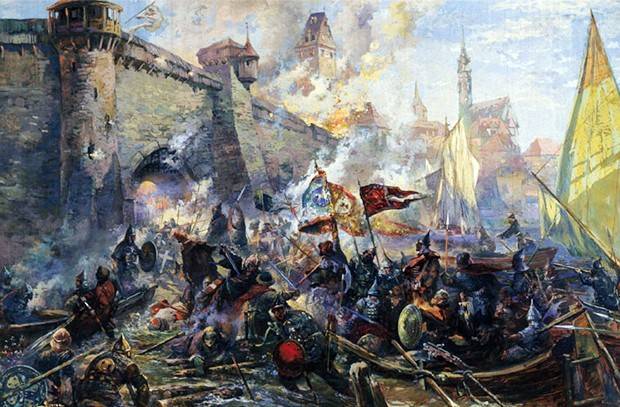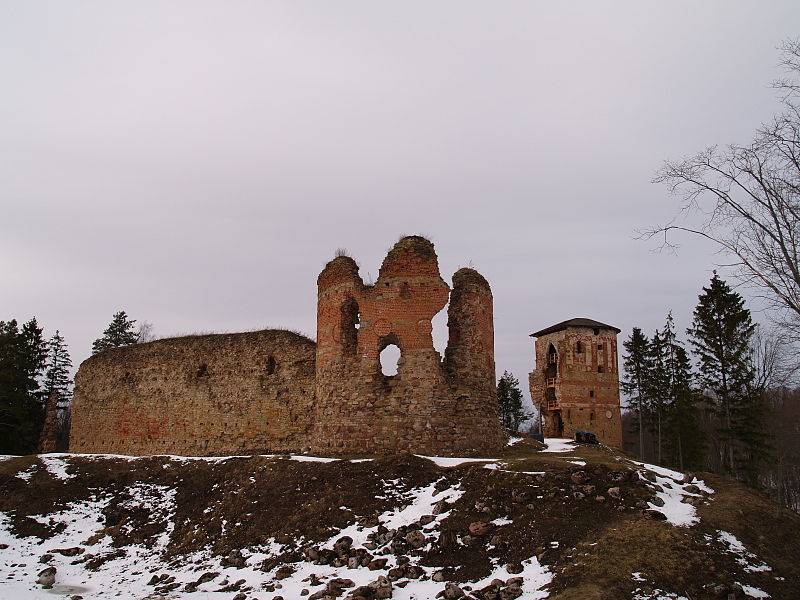Storm of Narva
Storm of Narva
The besieged Narva was in a critical position, she was threatened with hunger. Fearing that the city would capitulate, the Livonian commander Kettler decided to send reinforcements to Narva. On the night of May 1, a squad of Riga and Revel knights led by their Hauptmann (captains) von Zinghehof and von Strassburg, with the support of riders, attempted to march into Narva. Livonians ran into the Russian outpost and joined the battle. Having suffered losses, they still broke into the city. At the same time, the Russians captured the Livonian detachment.
In the afternoon of May 1, Kettler attacked the Russian outpost on the Revel road. Basmanov sent to help children of boyars and archers. Livonian cavalry overturned ours and began to pursue her. However, the Germans ran into an streltsy ambush, were shot at and ran. Our cavalry, having rearranged, counterattacked and began to pursue, chop and take prisoner of the mixed enemy. Apparently, the Russian troops used a common tactic with the Tatars (since ancient times, still from the Scythians) - false escape and luring the enemy into an ambush.
Having received reinforcements, the garrison of Narva fired upon Ivangorod again. After that, the Russian troops again launched a heavy bombardment of the fortress. On May 11 several fires broke out in Narva: “it caught fire in Rugodiv and burned fire in many places” (Russian Chronicler). Kettler wanted to speak to the city, but part of his subordinates opposed. After the first setbacks, the knights were afraid to be ambushed again and did not want to leave the fortified camp. Meanwhile, Narva fell. During a strong fire, the Livonian soldiers fled to the castle, leaving the city and guns. Noticing that the Livonians abandoned their places on the walls and towers of the city, the Russians began to force the r. Narova. Service people were transported in boats, rafts and built a temporary ferry.
Basmanov offered the townspeople to capitulate, recalling the promise to become a Russian tsar. After that, Basmanov led the people to the assault. The Russian gates were stormed by the archers of Teterin and Kashkarov, and the Kolyvansky (Revel) - Buturlin with the boyars. The archers broke the resistance of the townspeople: “Having archers the Russians with their stratilates, as well as a lot of arrows from ours, along with a handheld shooting, let them shoot at them. Abie let them go to the top ... ”(upper town, castle). The archers, having opened the gates, let hundreds of noble cavalry Basmanov and Adashev into the city. But through the Revel Gates, the people of Buturlin burst in. Thus the outcome of the battle was decided. The remains of the Narva garrison disappeared into the castle. Livonians still hoped for the arrival of Kettler.
The Russians put out the fire and got ready to storm the castle. From the side of the city, the castle was not as strong as from the outside. The guns captured in the city were deployed against the castle, and they began shelling, along with the Ivangorod artillery. The Germans were again asked to fold weapon: those who did not want to be a subject of the Russian tsar were promised a free pass along with their families and property; for those who wanted to stay - to compensate for the damage caused by the siege, to rebuild houses, etc. The remnants of the garrison seated in the castle and the townspeople who had managed to escape escaped, because they still hoped for the help of Kettler's troops. But their hopes were in vain. Meanwhile, the shelling intensified. Ammunition in the citadel was extremely small, as well as food. The castle was filled with citizens, a few hundred more people, unable to get into the crowded citadel, hiding in the castle ditch. As a result, in the evening of May 11 the Germans agreed to surrender.
The remains of the garrison received easy access. Residents of the city took the oath of allegiance to the king. According to the annals in Narva they took "big and smaller guns of 230." Obviously, some of the guns were beeper - heavy guns. So, the Livonian chronicler Renner reports about 117 guns and gakovnitsov (fortress muzzle-loading guns). Thus, by the morning of May 12, 1558, Russian troops occupied all of Narva. The capture of the fortress was important: 1) Narva, as previously noted, had military-strategic significance; 2) Russia received a convenient sea harbor, through which direct relations with Western Europe became possible. Also in Narva, the creation of Russian began fleet - a shipyard was equipped in which the masters from Kholmogor and Vologda began work. A fleet of 17 vessels was subsequently based in the harbor of Narva under the command of Danish national Karsten Rode (), who was accepted into the Russian service.

The capture of Narva by Russian troops in 1558 year. Artist A. A. Blinkov
Summer hike
The fall of Narva changed the nature of the war. Capturing a strong fortress with a rather insignificant Russian detachment, albeit with experienced warriors and commanders, showed Moscow all the weakness and friability of Livonia. Moscow realized that the time had come for the division of the inheritance of a “sick person” of Northeastern Europe. Ivan the Terrible, who initially just wanted to punish the Livonians and make them more accommodating, realized that the seizure of cities, ports and fortresses of Livonia was much more important than just the "Yuriev tribute." An exciting prospect was opened to include the Baltic states in the Russian sphere of influence. In addition, it was necessary to hurry, as Sweden and Poland drew to Livonia.
Therefore, when the Livonian ambassadors brought tribute in May 1558, the money was not accepted and the royal diplomats told the Germans that there was no faith in their words, now let the master and the archbishop of Riga beat the sovereign, begging for forgiveness, the sovereign for their “non-correction” ordered his governors “ over the cities are industrialized, as God will help them, ”therefore further negotiations are meaningless. Thus, now the Livonians had to regret that they had delayed the tribute for so long.
In the meantime, Ivan the Terrible sent his army to Neishloss (Syrensk) and other cities, led by one of the best generals of the Pskov Governor, Prince P. I. Shuisky. Apparently, they did not prepare a big hike in advance, so the army performed gradually, piece by piece. Voevods D. Adashev and P. Zabolotsky were the first to speak from Narva to Neishloss. The cavalry was on land, and the archers and the Cossacks with the "outfit" (artillery), led by Shestak Voronin, on the struts along the river Narove. The horsemen were sent forward hundreds of children of the boyars and Tatars, who became barriers on the roads from Kolyvan (Reval) and Riga, in case a master made a speech. 3 June 1558, a rather small army of Adasheva came to the Neishloss and began siege work. On June 12, 5 siege work was completed as a whole: “the tours of the city were set up and the outfit on the whole tour was installed, and the riflemen with food before the tours were put into the ranks. And they learned to shoot the city along with food from a warrior ”. On the same day, Prince F. Troyekurov came to the rescue from Novgorod with a small detachment. Neishlos Vogt Dirich von der Steinkule decided not to wait until the Russian guns pierced the gaps in the old walls and the fierce Muscovites went to storm, and surrendered on the third day after the start of the shelling. 6 June 1558, Neashloss capitulated.
The capture of Nashlossa - Syrenska opened the campaign of "Gradoishness". Next in line was Neuhausen - Novgorod and Derpt-Yuryev itself, the capital of the Derpt bishopric. In order to solve this problem, Shuisky assembled in Pskov a considerable number of men by European standards - 5 regiments with 47 centenary heads (about 8 - 9 thousand boyar children with servants) and 2 arrow orders of A. Kashkarov and T. Teterin (up to 500 - 600 arrows) . Livonians also brought a fantastic figure at all - up to 80 thousand people.
15 June 1558, a regiment of Shuisky, approached Neuhausen (Neuhausen), the border fortress of the Dorpat bishopric. Commanded by the Livonian garrison Jörg von Ikskyul refused to lay down their arms and surrender the castle. The Russian chronicler noted with respect: "The Germans beat the good cruelly and sat to death." Again, as near Narva and Neishloss, the Russian gunners and archers played an important role in the capture of the enemy fortress. When it became clear that the Germans did not intend to surrender, the governors ordered "tours put blisko cities and the order to move to the city." Under the cover of powerful artillery fire, our troops approached the fortress closely. The sounds of a strong cannonade were heard in the vicinity of the nearby Kirumpe Castle, where Master Fürstenberg and Derpt Bishop Hermann broke up with a small detachment of knights and knights in the fortified camp. The master, while the siege of the castle was on, stood in one passage and did not budge to help the besieged.
30 June 1558 of the year after the Russian artillery destroyed the walls and towers of the Germans stopped meaningless resistance. The remnants of the Livonian garrison were released. The fall of Neuhausen opened the way for Russian troops to Dorpat and they immediately went to the capital of the bishopric. On July 6, forward detachments of the Shuisky rati reached the Varbek castle, near Dorpat, and took it without a fight. The master could not prevent the Russians. In the Livonian camp there was confusion and vacillation, Fürstenberg did not dare to join with his demoralized army in a battle with the enemy. The master turned down the camp and began a hasty retreat, which fled. In this case, the Livonian rearguard was disheveled by Russian advanced forces, which were sent in pursuit. According to the Pskov chronicler, “our people followed him, and a German caught up with many of them”. The Livonian wagon train was partially captured, and Kettler, who commanded the rearguard, was nearly captured.
After the fall of Neuhausen and the flight of the Fürstenberg detachment, the army of Shuisky came by dry and water route (along Lake Peipsi) towards Dorpat-Yuryev. 8 July 1558, the Russian troops laid siege to the city. As E. Kruse, a participant in those events, wrote, “on a broad front, the enemy attacked us with three large thick columns covering themselves with hundreds of prancing scattered horsemen.” At the same time, the Livonians now determined the strength of the Russians by an even more enormous figure - 300 thousand people.

Ruins of the Neuhausen Castle
To be continued ...
Information